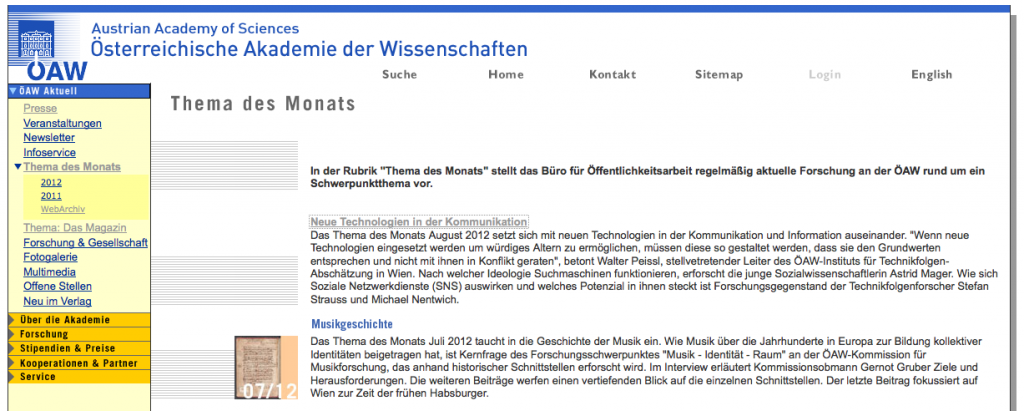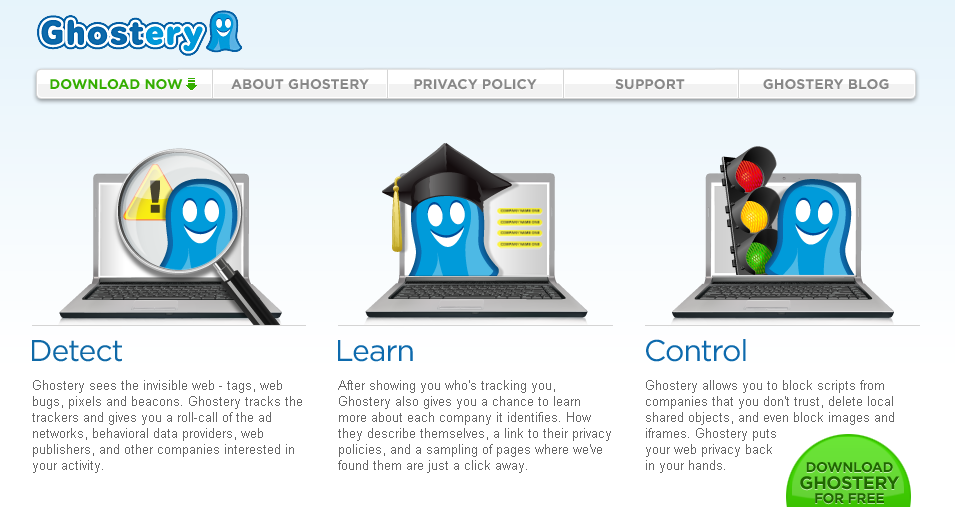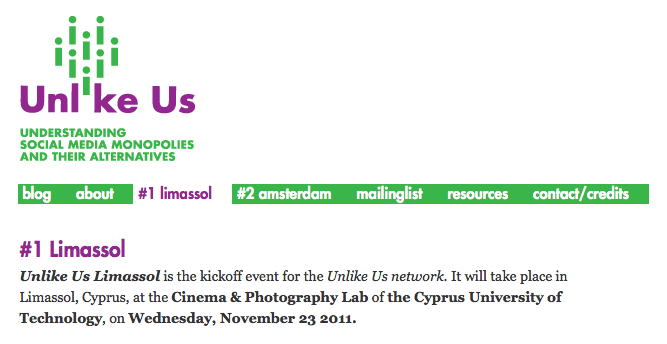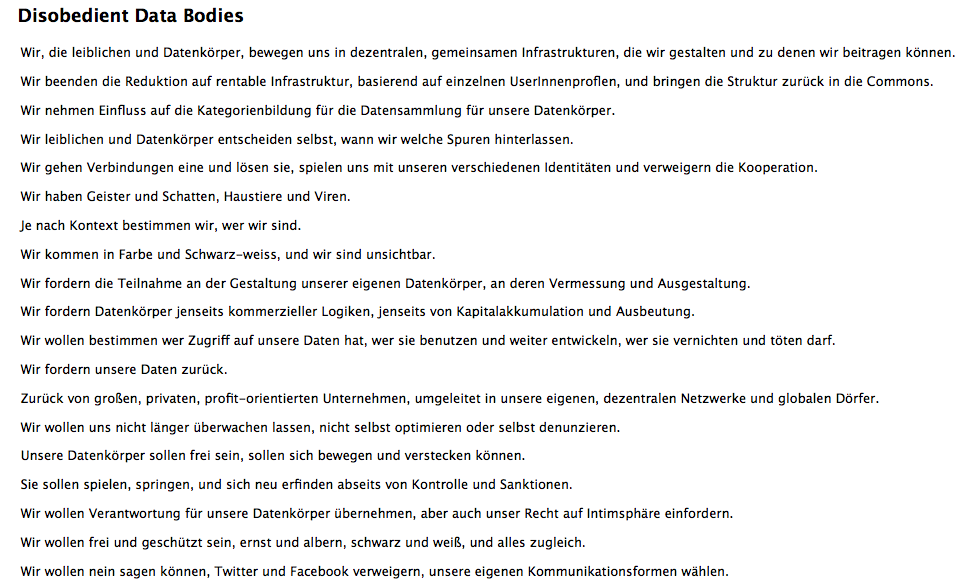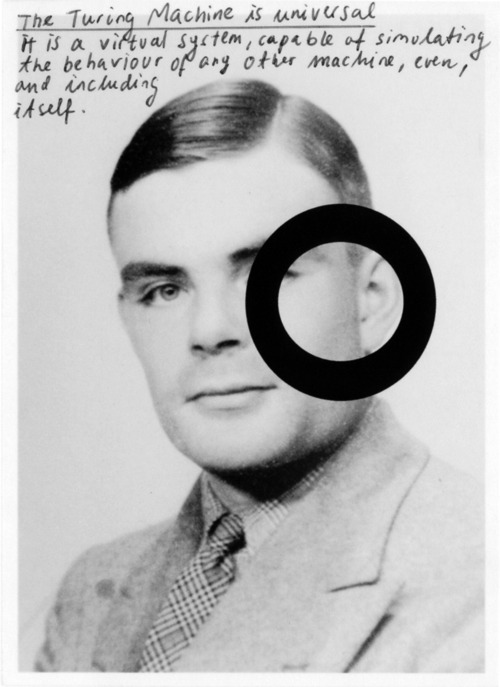Each month the Austrian Academy of Sciences defines and discusses a “topic of the month”. The current issue deals with new communication technologies and presents three ITA projects. Besides my own project “Glocal Search“, the EU projects “Value Ageing” and “European Perspectives on Cloud Computing and Social Networks” are featured. The ÖAW portraits of the projects can be found online or in the paper magazine “Thema Forschung” (October). Enjoy reading!
Tag Archives: social media
Pics & press coverage from APA eBusiness event
Last week we had a very lively discussion on new media – search engines and facebook – and privacy (see blog post below). Central questions were how these new online services use personal data to create profit, what privacy violations that involves, and how to meet these challenges with (EU) regulations and strategies of digital self-defense. It was a highly diverse, but really interesting combination of people on the round table including Johannes Juranek (CMS), Helmut Waitzer (Navax), Max Schrems (Initiative “Europa gegen Facebook”) und Markus Deutsch (WKO) and me.
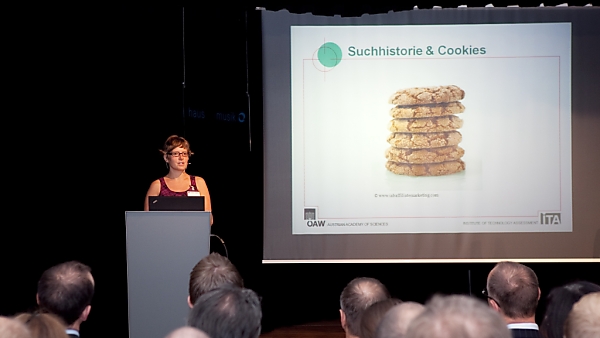 © photo credit: APA-Fotoservice/Rossboth
© photo credit: APA-Fotoservice/Rossboth
Check out the fotos & press coverage (e.g. APA Science & futurezone) of the event for more information!
Ghostery & more
Last week I attended the Unlike Us conference in lovely Amsterdam. The event, aimed at bringing together researchers, activists and artists concerned with Social Media Monopolies and their Alternatives, was covered pretty well by bloggers on site, as you can see here. Instead of repeating their work by blogging about the whole event, I just want to point you to a single tool I learned about: Ghostery.
Ghostery helps you tracking the trackers and gain back control over your privacy. “Ghostery tracks the trackers and gives you a roll-call of the ad networks, behavioral data providers, web publishers, and other companies interested in your activity.”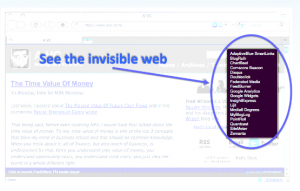 It’s a browser plug-in (for various browsers) that shows you the invisible web – tags, web bugs, pixels and beacons that are included on web pages in order to get an idea of your online behavior – and helps you to block and/ or manage them. Instead of passively running in the background, the app brings them to the foreground, and hence puts you in the active position of handling them. You should really check it out, it’s the best privacy tool I’ve seen in a really long time!!!
It’s a browser plug-in (for various browsers) that shows you the invisible web – tags, web bugs, pixels and beacons that are included on web pages in order to get an idea of your online behavior – and helps you to block and/ or manage them. Instead of passively running in the background, the app brings them to the foreground, and hence puts you in the active position of handling them. You should really check it out, it’s the best privacy tool I’ve seen in a really long time!!!
Besides, it was very interesting to see Max Schrems talking about Facebook vs. Europe. He’s an Austrian law student, but pretty professional in what he does. I hope he manages to bring Facebook to its knees! Blogpost on his talk here.
Finally, I attended the Oxford Internet Institute (OII) conference “Interdisciplinary Insights on the Social Science of Digital Research”, where I talked about the Performative Character of Digital Methods (see blog post below). It was a great event, which covered a range of digital methods and their ethical implications. I particularly enjoyed seeing Mike Thelwall talking about his network mapping tools since I’ve read about his work for quite some time now.
unlike us #2 amsterdam
And yet another pretty cool event I’ll attend in March (8-10); without presenting though. It’s the second event of the Unlike Us Network initiated by Geert Lovink (Institute of Network Cultures/HvA, Amsterdam) and Korinna Patelis (Cyprus University of Technology, Limassol). It’s supposed to bring together artists, designers, scholars, activists and programmers who work on ‘alternatives in social media’. That’s how the event is described on the network cultures institute website:
Unlike Us 2 will focus on the concept of free exchange and the commercial exploitation of online social relationships which lie at the heart of contemporary capitalism. In addition to speakers addressing this theme a range of alternative social media projects will be showcased. Facebook makes everyone believe There Is No Alternative, but Unlike Us dares to differ. – I’m curious about that!
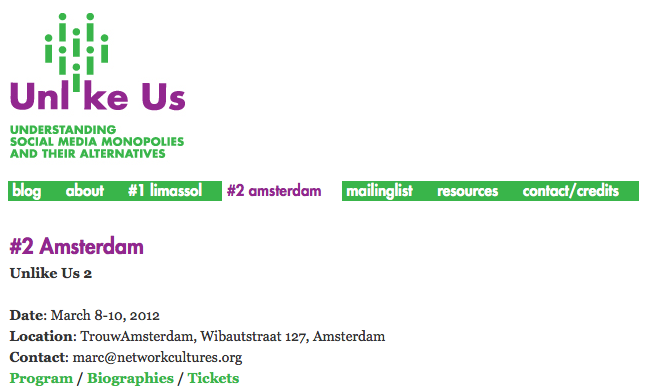 Confirmed speakers and presenters: David M. Berry (UK), Frederik Zuiderveen Borgesius (NL), Philipp Budka (AT), Thomas Chenesau (FR), Jodi Dean (USA), Carolin Gerlitz (UK), Seda Guerses (TR/BE), Spideralex (ES), Anne Helmond (NL), Eva Illouz (IL), Walter Langelaar (NL), Ganaele Langlois (CA), Carlo v. Loesch/lynx (DE), Caroline Nevejan (NL), Arnold Roosendaal (NL), Eleanor Saitta (USA), Max Schrems (AT), Elijah Sparrow (USA) and James Vasile (USA).
Confirmed speakers and presenters: David M. Berry (UK), Frederik Zuiderveen Borgesius (NL), Philipp Budka (AT), Thomas Chenesau (FR), Jodi Dean (USA), Carolin Gerlitz (UK), Seda Guerses (TR/BE), Spideralex (ES), Anne Helmond (NL), Eva Illouz (IL), Walter Langelaar (NL), Ganaele Langlois (CA), Carlo v. Loesch/lynx (DE), Caroline Nevejan (NL), Arnold Roosendaal (NL), Eleanor Saitta (USA), Max Schrems (AT), Elijah Sparrow (USA) and James Vasile (USA).
goodtosee #10: unlike us & disobedient data bodies
A new network initiative has been circulated in mailing lists over the past couple of days. It’s called “Unlike Us. Understanding social media monopolies and their alternatives” (Concept: Geert Lovink (Institute of Network Cultures/HvA, Amsterdam) and Korinna Patelis (Cyprus University of Technology, Limassol). Its critical approach to social media definitely deserves a #goodtosee blog post! The central aim of the initiative is to establish a network of artists, designers, scholars, activists and programmers who work on ‘alternatives in social media’. Planned are a series of events, a reader, workshops, online debates, campaigns etc. By pursuing these initiatives Unlike Us intends to both analyze the economic and cultural aspects of dominant social media platforms and to propagate the further development and proliferation of alternative, decentralized social media software, as may be read on its website. In doing so it wants to go beyond the culture of complaint and ask overarching questions about how to tackle fast-emerging monopoly powers:
Without falling into the romantic trap of some harmonious offline life, Unlike Us asks what sort of network architectures could be designed that contribute to ‘the common’, understood as a shared resource and system of collective production that supports new forms of social organizations (such as organized networks) without mining for data to sell. What aesthetic tactics could effectively end the expropriation of subjective and private dimensions that we experience daily in social networks? Why do we ignore networks that refuse the (hyper)growth model and instead seek to strengthen forms of free cooperation? Turning the tables, let’s code and develop other ‘network cultures’ whose protocols are no longer related to the logic of ‘weak ties’. What type of social relations do we want to foster and discover in the 21st century? Imagine dense, diverse networked exchanges between billions of people, outside corporate and state control. Imagine discourses returning subjectivities to their ‘natural’ status as open nodes based on dialogue and an ethics of free exchange.
The kick-off event will take place in Limassol (Cyprus) and focuses on how the facilitation of free exchanges and the commercial exploitation of social relationships, which lie at the heart of contemporary capitalism, belly social media (23 November 2011). For more infos on the kick-off meeting go to this page or subscribe to their mailing list.
I’m really happy to see a more critical approach to social media and will most certainly follow their activities! The questions they pose are highly relevant in an age of monopolist, for-profit internet technologies and go far beyond social media. Similar claims could – and should – be made about search engines, as I discussed in my recent article “Algorithmic Ideology“. The initiative Unlike Us further nicely relates to discussions we had at the Symposium Knowledge Machines between Freedom & Control in Hainburg (see also this blog post), where we arrived at similar questions and the need to think about and work on alternative technologies accountable to “the common” rather than monopolist companies making profit with our content and data. If you feel the urge to articulate your discomfort and complaints about Facebook, Google & co. and their privacy policy & business models you are more than welcome to contribute to the manifesto we created as part of the Hainburg event. It’s titled “Disobedient Data Bodies” and may be found here. Enjoy reading it, sharing it, continuing it, or adding some fancy background image since it’s still a little plain & white for a manifesto, as you can see below 😉 – both German & English texts are welcome!
goodtosee #7: art & aesthetics online
Today I’d like to share two tumblr blogs with you. The first one is “the threshold of the visible” by Fliegender. This is a huge & great collection of artistic images ranging from the fields of architecture, classical and concept art, history, war, new media and computing, such as the one showing Alan Turing (see below) – just to feature one of the truly amazing, often historic images.
Henrik Olesen, Some Illustrations to the Life of Alan Turing (A virtual system, capable of simulating the behaviour of any other machine, even, and including itself), 2008. via Fliegender & We Find Wilderness
The second one is curated by my HUMlab colleague Mike Frangos, who collects videos on his blog “Social Media Aesthetics“. The assemblage includes interesting pieces such as Robot Flâneur, an explorer for Google Street View, Larry Lessig on Scientific Publishing, the Kristoffer West Johnson-animated video “Berlin Wall”, MACHFELD’s M1+1 performances, the Cults with footage from Anna (Pierre Koralnik, 1967, below), and many more. Mike has also started a collection of “Beckett on Youtube” here. I hope you enjoy rummaging through these rich art collections as much as I do!
Cults – Abducted from George Tanasie on Vimeo.
goodtosee #1: diaspora & mubi
After a great time in Vienna, Linz and Tirol I’ve returned to Umeå, where the snow is still piling up. Although I’m not a big fan of New Year’s resolutions I thought to clean up my life a little bit over the turn of the year. The probably most liberating decision was to drop the idea of turning my PhD into a book. Instead of reworking the same piece of text over and over again or paying a lot of money to get it out there as a book, I’ve decided to put it online and upload it on textfeld, an Austrian platform for sharing and discussing academic work. Further, I’m working on journal articles, that are much more fun to write anyway. Blog-wise I’ve decided to introduce a new rubrique aiming at discussing one website, initiative, institution, or online platform I find worth to spread per month. I call it goodtosee.
To start with – and against my own idea of discussing one site per month – I start out with discussing two social networking sites: Diaspora and MUBI. Invited by my colleague Jana Herwig I joined Diaspora just to see what it’s like. Created as an alternative to Facebook, which spams you with news, apps and ads, Diaspora looks minimal and friendly.
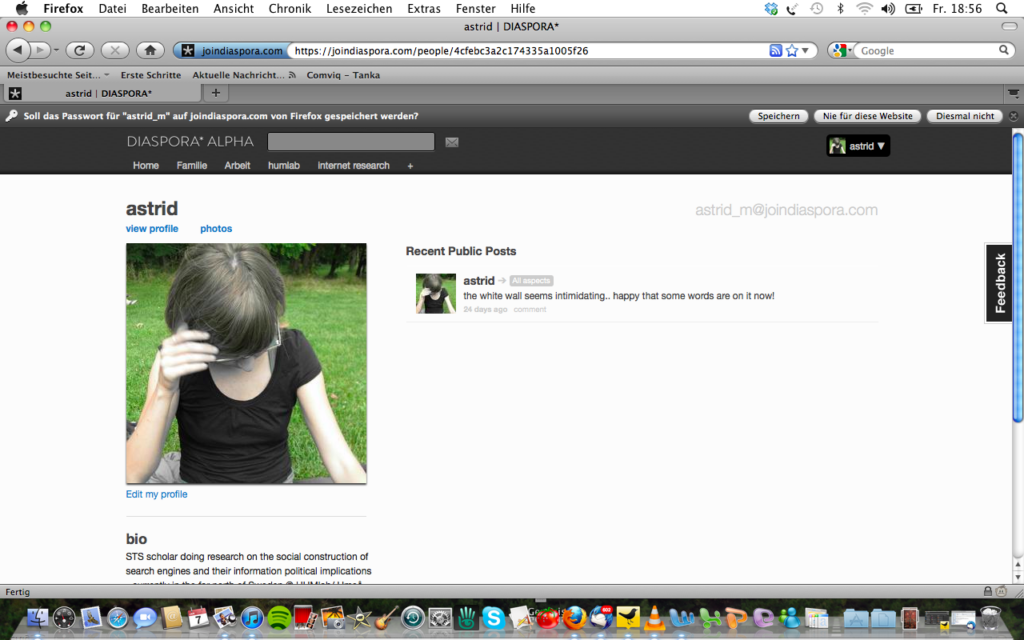 Instead of “friends” you add “family” or “work”-related people or whatever category you invent yourself. This seems sympathetic since the one-size-fits-all friends category has become empty anyway. Further, the lack of advertising and news spam is extremely pleasant. Despite the sympathy I have for the platform I haven’t really figured out what to do with it yet. Browsing the profiles of my – so far – two contacts makes it hard to see what their social relations are, also because the news channel is lacking. So the social surveillance we’ve learnt on Facebook doesn’t quite work here. Further, the function of importing images, links to websites, or youtube movies seems to be complicated, if possible at all, which makes it hard for me to get started. The reason for that might be just my own incapability to let go of all the annoying, but at the same time handy features I got used to on Facebook. Or the lack of friends or rather lack of “family” and “work” I have on Diaspora. In any case I’m curious about the platform’s further development – it’s an alpha version and feed-back is appreciated – and whether I’ll be part of it. Let me know if you wanna try it out yourself; I’ve still some invitations and would be interested what you think of it!
Instead of “friends” you add “family” or “work”-related people or whatever category you invent yourself. This seems sympathetic since the one-size-fits-all friends category has become empty anyway. Further, the lack of advertising and news spam is extremely pleasant. Despite the sympathy I have for the platform I haven’t really figured out what to do with it yet. Browsing the profiles of my – so far – two contacts makes it hard to see what their social relations are, also because the news channel is lacking. So the social surveillance we’ve learnt on Facebook doesn’t quite work here. Further, the function of importing images, links to websites, or youtube movies seems to be complicated, if possible at all, which makes it hard for me to get started. The reason for that might be just my own incapability to let go of all the annoying, but at the same time handy features I got used to on Facebook. Or the lack of friends or rather lack of “family” and “work” I have on Diaspora. In any case I’m curious about the platform’s further development – it’s an alpha version and feed-back is appreciated – and whether I’ll be part of it. Let me know if you wanna try it out yourself; I’ve still some invitations and would be interested what you think of it!
The second platform worth mentioning is MUBI. MUBI is an African city, but it’s also a social network dedicated to watching, sharing and discussing movies. The platform is more intuitive than Diaspora since it has all the basic features we got used to in the past: It has a news channel, it links to Facebook and Twitter, and it provides you with a profile you can design with the help of familiar features.
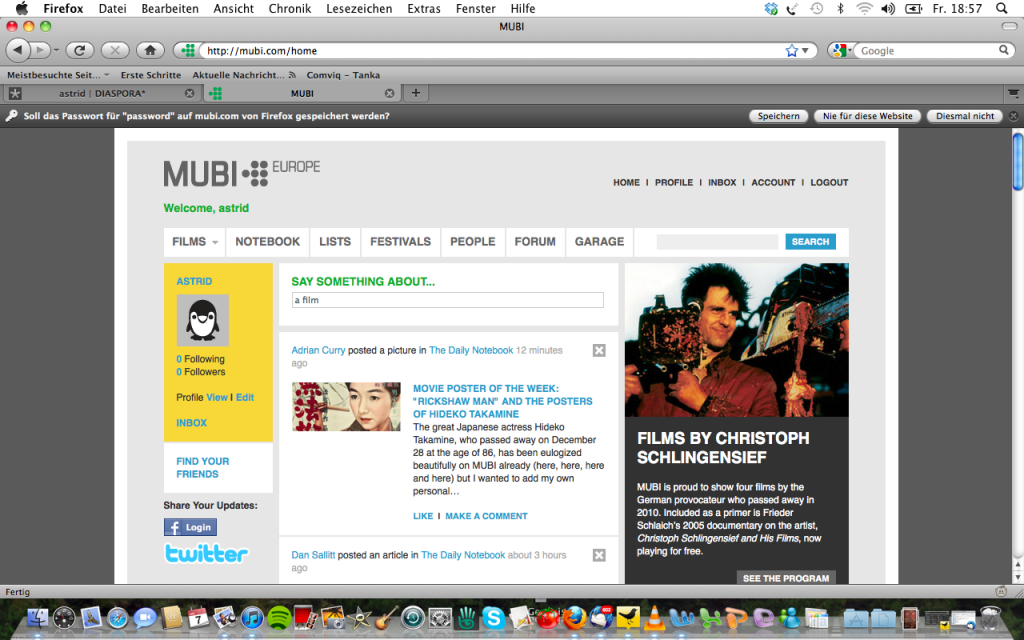 Its main purpose, however, is to offer a movie database and stream all types of movies, from classics to recent films, for a small amount of money (1-3 Euros). The movies that are top-rated and thus presented to users on the homepage are no blockbusters, but films usually shown at small film festivals around the world. This makes the platform immediately interesting to me, not to speak of the films by Christoph Schlingensief that are featured as well. When digging into the films, however, one big problem occurs: due to different copyright regulations in different countries not all films may be watched in all countries.. so it’s a bit of a lottery whether you can actually watch the movie you wanna see. Hence, if you’d like to watch old classics the Internet Archive might actually be the better option for you. Apart from that I highly recommend all film lovers to check it out!
Its main purpose, however, is to offer a movie database and stream all types of movies, from classics to recent films, for a small amount of money (1-3 Euros). The movies that are top-rated and thus presented to users on the homepage are no blockbusters, but films usually shown at small film festivals around the world. This makes the platform immediately interesting to me, not to speak of the films by Christoph Schlingensief that are featured as well. When digging into the films, however, one big problem occurs: due to different copyright regulations in different countries not all films may be watched in all countries.. so it’s a bit of a lottery whether you can actually watch the movie you wanna see. Hence, if you’d like to watch old classics the Internet Archive might actually be the better option for you. Apart from that I highly recommend all film lovers to check it out!
I think these two websites are goodtosee because both of them are innovative and refreshing alternatives to big, commercial companies. Despite some initial difficulties I would love to see them grow and become serious competitors to money-driven platforms using our personal data to raise their revenues.

